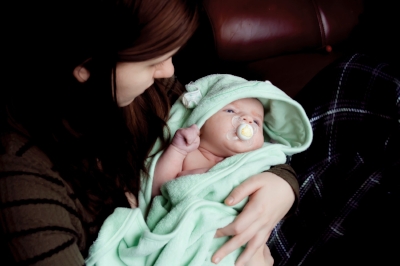
I am the mother of five children, ages 14 down to 2½. Before every baby is born, I’m in denial. Denial about what life is really like after I have a baby. All I can think about is the pregnancy and planning for the birth. The rest? Well, that will just take care of itself: Dinners will magically…appear? Children will somehow be…taken to preschool? The baby will sleep…and I’ll sleep, too? Yeah right!
Full disclosure: I hate those first few weeks with a newborn. They are So. Very. Hard. As much as I feel awed, elated, and grateful each time we, thank G-d, have a new, healthy, adorable baby in our family, I also feel mired in the dread of unending toil, coupled with my own birth recovery. Physically, mentally, and emotionally—it’s too much to handle.
I’m envious of traditional cultures that require a new mother to stay in bed for forty days. Can you imagine? Like you’re a queen. It’s forbidden to get out of bed, other than when absolutely necessary? It’s asur? What a life. I presume our foremothers had that kind of life. We have a hint in the Torah about recovery time: Women brought an offering to the Beit Hamikdash, the Holy Temple, after giving birth—either forty or eighty days postpartum.
By contrast, we live modern, individualistic lifestyles, where women feel pressure to “do it all”, and we internalize an expectation—true or not—of being able to be back to running the house immediately upon returning from the hospital.
But we are not meant to do that. We have to be told—in fact educated—that we need time to recover, and time to devote exclusively to the baby.
And therefore, we need help. We need support. Here are 5 top tips for getting what you need during the postpartum weeks, if not months.
Top 5 Postpartum Tips:
-
Get a right-hand person (or people) with you for the first weeks. This can be a family member: your husband, mother, mother-in-law, older child, aunt, grandmother, etc. For some people, it makes more sense to have someone not related—a trusted friend, or hired help, such as a postpartum doula, night nurse, babysitters, or any combination thereof. Helpers handle household chores and errands, hold the baby while you take a shower or sleep (or just want a break!), and bring you healthy food and drink to nourish yourself. They take the [laundry] load off.
-
Have a meal train. Immediately after you give birth, have someone set up a meal train online (such as www.takethemameal.com). You can specify any food particulars for your family (gluten-free, particular hechshers, our-kids-only-eat-spaghetti-without-sauce-and-don’t-eat-peas kind of thing.) The meal train is usually one full meal per day, for two to three weeks, and yes, it includes Shabbat meals. If you already have children, you can start the meals before you come home from the hospital, relieving your husband of the need to make dinner in your absence (why not?).
In addition to providing food for your family, these volunteer meals also build community. If you are up to speaking with the person delivering, the meal drop-off provides social interaction. And if you’re not up to chatting (totally understandably), the meal still serves as a literally-warm sign of support, and certainly helps you out in dealing with the daily, “What’s for dinner?” question. I believe meal trains help prevent postpartum depression.
-
Sunshine, fresh air, and a shower every day. These three routine implementations provide health and rejuvenation. Sunlight gets circadian rhythms on target (you hear that, Baby?), lowers rates of depression, and provides physical warmth and vitamin D. Fresh air—no need to explain. And that shower—that’s the clincher—the chance to refresh physically (see #1, above).
-
Join new mothers’ groups. These might be new mommy support groups, postpartum exercise groups, or breastfeeding support groups. Oftentimes, mothers join these groups after their first baby is born, and they can also apply after your second baby or beyond. The groups provide an outlet for “getting out of the house”, social interaction, and trading tips. While some are agenda-driven, or lead to mothers compare themselves to each other, they too can be positive—a forum for remaining confident in who we are and what we want for our babies and ourselves. Take what you want and leave the rest.
-
Above all: go with your instincts about what you and your baby truly need. One of the most likely causes of hardship during postpartum (and frankly, all of parenthood, and even life) is the tendency to doubt ourselves. Specifically with dealing with our recovery and our babies, there is so much conflicting information out there, from how-to books, doctors, well-baby clinics, and The Internet, that it’s a challenge to hone in on what’s best for you and your baby. So here’s the thing: You. Are. The. Mother. ‘Nuf said.
I hope these tips will empower you with your postpartum journey, and in the meantime, I wish you a b’sha’ah tovah—all in good time. May you have an easy birth, a good recovery, and all the support you need.